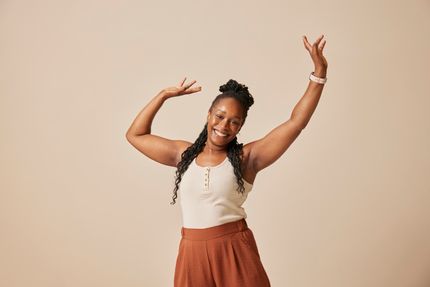

Disa (52): “Menopause? That word was never used in my family or among those around me.”
Disa (52) is married and looks after her four children on a daily basis. She has now lived in the Netherlands for 20 years. In her family and among those around her, there are subjects you simply do not discuss. Not even with your partner or your mother. “Not because it’s forbidden, but it’s just the way things are. You naturally learn what is best kept to yourself.” That is how it has always been for Disa. You don’t talk about your period, and certainly not about what happens as you get older. Menopause? That word was never mentioned. As if it didn’t exist.

At first I thought I was unwell. Then I thought I was burnt out. I wondered if I was losing myself.

Hot flushes, night sweats, and irritability
About three years ago, Disa began experiencing her first symptoms. She didn’t immediately think of menopause. First came the hot flushes. “As if someone had switched on an oven inside me.” She thought she was unwell. Then the night sweats started. She would toss and turn for hours and could barely function during the day. Then she thought she was suffering from burnout. After that, she would cry for no reason or suddenly become furious. She wondered if she was losing herself. “I was ashamed. My mind didn’t work the way it used to. Everything felt overwhelming. I forgot things. My body changed, but so did my confidence.”

I tried to hide it for a long time. Because among those around me, there is little space for this kind of vulnerability.

“It was never discussed among those around me”
Those around her expected her to care, to keep going, to be strong, and not to complain. Always carry on. “I always felt that your worth as a woman is linked to your fertility and caring nature. Menopause? That meant the end of those things.” She felt left out. Her husband noticed she was changing, but didn’t understand. He asked why she was so irritable, why she cried so often. Disa couldn’t answer that either. She didn’t really know herself. Her mother told her she should go outside more often to get some fresh air and ‘clear her head’. A friend told her that everyone is busy. She just had to stay strong.
Taking the first step
Eventually, she couldn’t get out of bed any more. She wasn’t unwell, but she simply couldn’t do it. Everything in her body said: stop. That was the moment she reluctantly went to the GP. After she told her story to the GP, the GP calmly said: “It sounds like you are going through menopause.” “It felt like a weight had been lifted.” At last, recognition and pride that she had taken the step to seek help. Still, she wanted to deny it at first. Not because she didn’t believe the GP, but because she was afraid of what it meant. Disa had an image in her mind: old, discarded, no longer feminine, useless.
Talking helped
The GP told her to see a specialist. She was given leaflets, but hid them at home. What if her husband or children saw them? Still, she went to the menopause consultant. “And there, for the first time in my life, I heard that what I was feeling was completely normal. That thousands of women go through exactly this storm. Not because they are weak or too emotional, but because their bodies are changing. And that it’s nothing to be ashamed of.” It felt like a liberation, but also painful. She felt she had shortchanged herself for years. But talking helped. She received practical advice and learned to set boundaries. She started walking, writing, breathing. Small things that made a difference.
How is she now?
Disa spoke to her husband again. At first, there was discomfort, misunderstanding, and silence. “I honestly told him how I felt. He may not have understood everything, but he listened.” She has set boundaries with those around her. She doesn’t tell everyone what’s going on, but she no longer stays silent when someone makes a remark. “Sometimes it’s quiet then, but that’s all right.” Disa is doing better than before. She has accepted her new phase of life. She is learning to deal with it, especially with menopause and the reactions of those around her. That takes time, but she understands her body and feels more confident.
Personal stories











